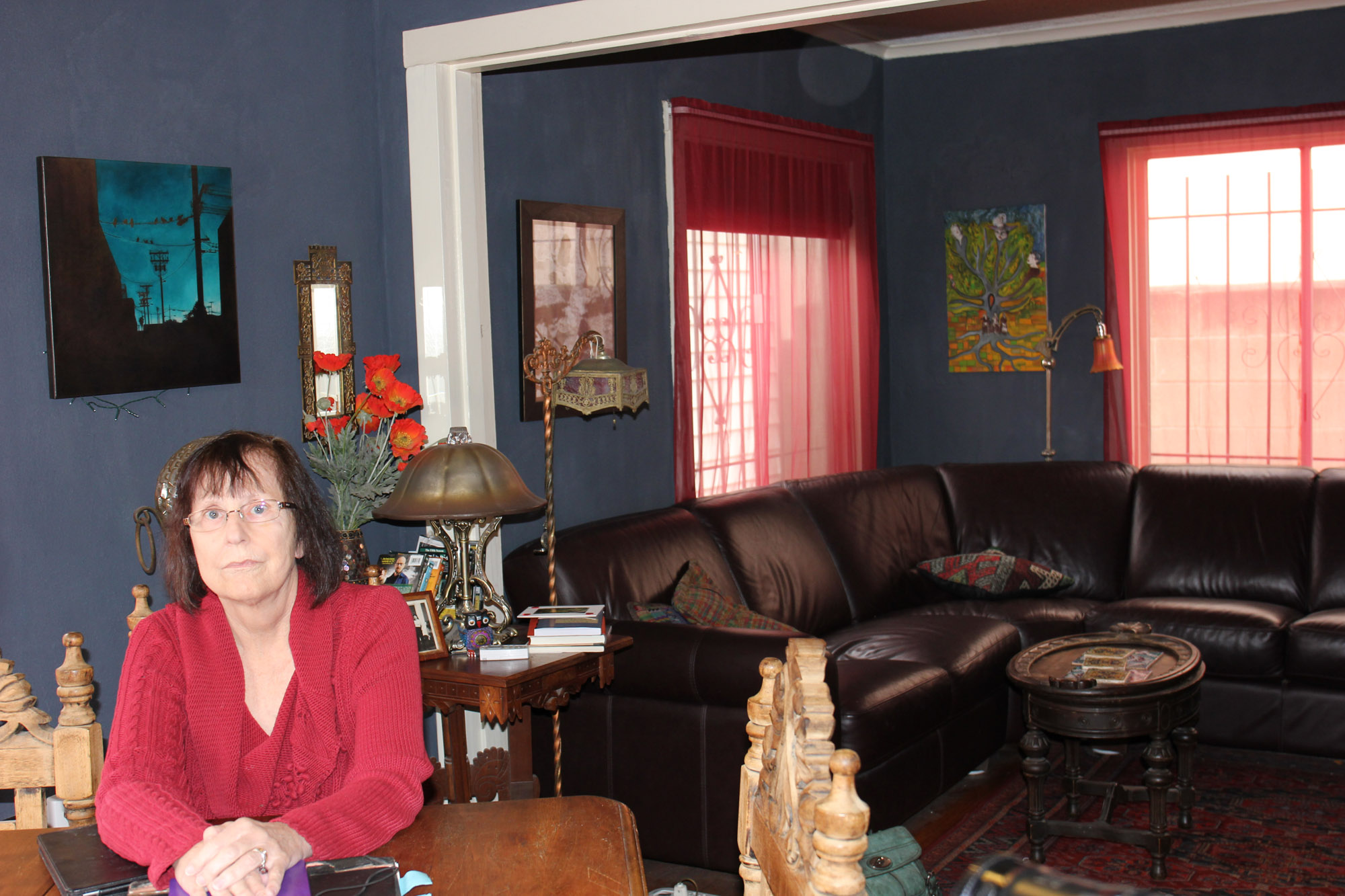Rae Armantrout Go to Transcript
Location: San Diego, CA | Date: March 27, 2014

Rae Armantrout (born 13 April 1947) is an American poet generally associated with the Language... Full Bio and Bibliography
"Well, actually, I probably work primarily in this old school device called 'notebook' where I, you know, fill pages with illegible text, and then once I start to think that my text is coming together, very often I'll do a version of it--just type it into the iPad."
From interview
section 1, "Devices and Digital Practice"
0:00:00
"I mostly save over, which is not a good idea. But sometimes I have printed out drafts, and I save drafts. I probably do not save all of them, which is not great, but I save a number of them and then eventually, I'll probably give them to the library."
From interview
section 2, "Current Practice (Digital vs. Physical Files and Formats)"
0:05:10
"I do have a back up on a zip drive, but I haven't backed-up for several months. So, I'm careless."
From interview
section 3, "Archives and File Back-Ups (Using Email as an Archive Tool)"
0:06:21
"This is really old school. But the way I use it is, it helps me order—not only keep the poems for the manuscript, but I order the manuscript this way. I mean, I kind of decide what reads well by trying the poems out in different places."
From interview
section 4, "Physical Manuscript Archives and Organization"
0:08:10
"I was interested in poetry since childhood. My mother read poetry to me. I wrote when I was a little kid, then I kind of stopped for a while. And then I started again in college and I was reading the poet Denise Levertov..."
From interview
section 5, "Writing Career and Education"
0:11:25
"I often start that way--then, and still, you know. Just something that I hear or see, sort of peaks my interest. It could be something I read, and I'll write down a passage, or I'll write down something I overhear someone say, or even on television, I could hear something that I write down. And I kind of collect those things like a magpie until something starts to take off."
From interview
section 6, "Generative Practice for Early Poems"
0:20:02
"I still, like I say, work in notebooks; but I am sure that I started going from the notebook to the computer sooner than I would have on a typewriter."
From interview
section 7, "Transition and Revision (Transferring Notes to the Typewriter or Computer)"
0:21:59
"I would type something up and send it, usually to a couple of people--two or three people--and I would get responses back. But it certainly--I mean, now we're so used to kind of this instant dialogue, instant gratification. Sometimes I think that that's, you know, maybe that's why I'm writing faster now. Really, it is the stimulation of that."
From interview
section 8, "Correspondence and Revision (Letters vs. Email)"
0:25:05
"I want there to be some kind of possible perceptible connection, but I also want it to be surprising. I want it to kind of go somewhere that you didn't expect it to go, or that I didn't expect it to go. So, sometimes the first thing I come up with is too obvious and sometimes what I come up with is too random. It's like Goldilocks and the Three Bears."
From interview
section 9, "Revision Priorites and Process"
0:31:26
"I know you can save things on your hard drive and give your hard drive to a library, but God knows what's on my hard drive. So, so far I've just--what I do now is, if there's anything that seems especially interesting or valuable, I'll print it out and keep it."
From interview
section 10, "Finished Work and Correspondence (On Developing An Archive)"
0:38:14
"Which is really stupid because it's RAEA100900. I shouldn't say that anything my son said was stupid, but he was only about fourteen and I guess he thought that was--I feel like I'm James Bond or something with that email address."
From interview
section 11, "Social Media and Introduction of Email"
0:41:57
"Well, I was never a great typist, so I was always making mistakes. So, it was always frustrating. Of course sometimes I hate my computer, too. I mean, it's not a question of the typing issue, but just--you know, we all hate our computers."
From interview
section 12, "Infulence of Digital Tools on Daily Practice"
0:43:54
"I'd probably have to have a few lines before I thought it was worth reading them out loud."
From interview
section 13, "Reading Aloud From Notebooks as Revision Process"
0:44:59
"I'm using some ancient poets like Lucretius, who wrote about science, you know. I mean, he wrote--the ancient Greeks like Lucretius knew about--or, not knew but hypothesized the existence of atoms and the void. So, I was just doing some research about him on the computer and then printing them out."
From interview
section 14, "Internet Research And Generative Principles (Relationship Between Physics and Poetry)"
0:51:33
"I think that when you teach young people, you kind of, sort of stay in that world. You hear their expressions--I'm not saying I'm a digital native by a long shot--but you know, you sort of hear the way they talk and you get a bit of their mind set, and you know, you know their lingo. In a way that, I think, when I retire, I might miss that."
From interview
section 15, "Digital Influence on Teaching"
0:56:11
"I've just recently wrote a poem that references Mileage.com."
From interview
section 16, "Digital Influence on Poetics (Form and Content)"
0:58:24
Interview Materials
Writing Process Visualization (View All)
Process Narrative Excerpt:
"Rae Armantrout begins most of her poems by hand, in a notebook, filling pages with what she refers to as "illegible text" to initiate the drafting process. Prior to the advent of personal computers, she would remain in the handwriting phase much longer before eventually..."